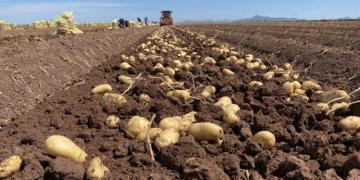Irlanda: Farmers urged to protect potato crop as nationwide blight warning issued
Farmers have been urged to protect potato crops as Met Éireann issue a potato blight advisory for the whole country.

According to the national forecaster, conditions for the spread of the disease will develop nationwide from Thursday night until Sunday morning.
Teagasc’s Potato Specialist, Shay Phelan, says that blight warnings are common this time of year, but should be still taken seriously.
He said: "Blight warnings this time of year are pretty typical, so it is nothing unusual. That being said, people who grow potatoes, commercially or even amateur growers, should not ignore the warnings."
He believes that commercial growers are well prepared for blight warnings, and are aware of the difficulties the disease can cause.
He said: "Commercial growers will probably spray a fungicide on their crops anyway. They won’t take any risk of getting blight into their crops, because once you get blight, it is very difficult to remove.
Commercial growers generally take a preventative approach. They will be proactive and protect their crops, because they have a lot of money tied up in them.
However, Mr Phelan, is worried that back garden growers won’t take the same approach.
"My main concern would be with amateur growers, people who may not be paying much attention to the blight warnings, and who only spray periodically for blight. They are the ones I would worry about.
"They must look at their crops and make sure they have some cover on them, and not to be fooled by trying to grow them organically. While there are organic varieties out there, most of the varieties that we grow in the country are not organic, so they will be susceptible to blight.
The bottom line is, if people are growing potatoes on a commercial scale, or on an amateur scale, they should certainly heed this warning," he said.
For blight control, Mr Phelan recommends that farmers use a systemic type of fungicide, like Infinito or Zorvec, something that "moves up through the plant with the addition of new leaves and stems."
He said that potato crops are going through a "rapid growth phase of the canopies" at the moment, and that they are "increasing at a fairly substantial rate every week."
According to Mr Phelan, the showery, warm, and humid conditions that we are experiencing across the country in recent weeks are the ideal conditions for blight to develop and spread.
He said: "We have warm temperatures now, 20C and above, and once you get rain with those temperatures, those are the conditions that favour blight.
Blight will move very quickly and it will come from sources like rotten potatoes or rotten plants, and it will spread from those plants into crops or into other plants as well."
Met Éireann has encouraged farmers to spray today and Mr Phelan believes this is in order to "get the blight fungicide onto the crops before the infection starts."
He said: "Once the spores land on the leaf, the fungicide acts in a way that will kill the spores, and stop them infecting the plants."
He also believes that Met Éireann has recommended farmers to spray today because it is dry.
"We need dry conditions to spray on the fungicides so that they dry out the plant. They are most effective when they go on in conditions like that.
"The idea is to get in before that problem occurs and prevent that problem in the first place," he said.
According to Mr Phelan, infected crops will sport "pale green or slightly brown legions on the plant" and a little "white fur" will grow on the legion as well.
He advised anyone concerned to google ’late blight’ and if they see those on the leaves, then they know they have a problem.
"What tends to happen with blight is you don’t get an infection over all the seeds, you tend to get it in spots, maybe under trees or around poles, where the fungicide hasn’t reached during spraying, but then it spreads to the other parts of the crop.
If it starts to get away on you, you either remove the plants, or spray off the area of the crop that is infected, to kill those plants, and kill the source of infection," he said.
Blight is a destructive fungal disease of potatoes resulting in dry brown rot of the tubers, making them unusable.
New strains
According to Agricultural Meteorologist, Dr. Pádraig Flattery, "warm, humid weather is required for blight to spread."
He said the risk of blight is based on temperature and humidity. The temperature must be over 10C and the humidity over 88%.
Dr. Flattery has encouraged farmers to "apply fungicide where appropriate to prevent the infestation of blight."
He also said it is necessary "to remove and destroy any plants that have been affected."
He advised organic growers to use "an approved copper sulphate solution if they can’t use fungicides."
He said: "Blight-affected foliage should be removed immediately and destroyed to prevent the spread, as spores can be carried large distances over wind and affect neighboring crops."
Dr Flattery also warned that "new strains of blight are developing which are resistant to common fungicides."
He said awareness of this is "vital to ensure crop loss is minimised."
He had this advice for gardeners who grow potatoes: "Garden growers should check out our blight forecast maps and see if they are in the danger zones. If so, they should take precautionary measures such as planting potatoes in a breezy space with plenty of space between plants to avoid disease spread, and treat with fungicide before blight appears if necessary.
"Crop rotation should occur regularly to prevent build-up of the disease in the soil. If any sign of blight develops, it is vital that infected plants and tubers are removed and destroyed to prevent spread."
Fuente: https://www.irishexaminer.com/news/arid-41168038.html




